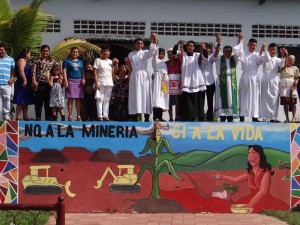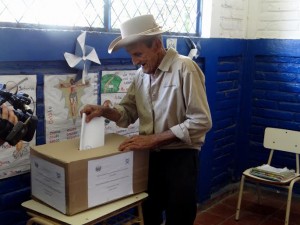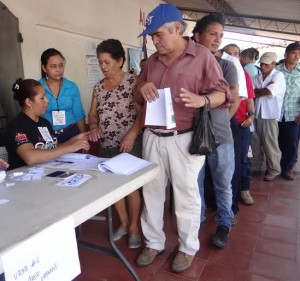 Since 2014, organized farmers from several municipalities of the department of Chalatenango, located in the north of the country, have expressed their full rejection to a mining operation in the area. In November this struggle has represented an important precedent and has compelled the local government to start the process of passing a municipal law that will prohibit companies from exploiting gold and other metals from the mountains.
Since 2014, organized farmers from several municipalities of the department of Chalatenango, located in the north of the country, have expressed their full rejection to a mining operation in the area. In November this struggle has represented an important precedent and has compelled the local government to start the process of passing a municipal law that will prohibit companies from exploiting gold and other metals from the mountains.
The four referenda that have taken place in potential mining areas of the country have vindicated the villagers’ position, showing that more than 80% oppose mining. Thanks to popular opposition, the mayor of the municipality of San José Las Flores has begun drafting a municipal order that will prohibit all types of metal extraction in the mountains and forests bordering the municipality.
“This kind of activity is necessary for the population to unite, grow and become aware, so that the people can express their opposition to the mining projects. We hope that other municipalities will pass ordinances to ban mining and to protect the natural resources that allow us to live,” said José Avelar, the mayor of Arcatao.
The example set by the farmers of San José Las Flores motivated other communities and mayors of other municipalities to organize referenda on prohibiting mining. Now, their objective is not only to protect the place where they live, but also to have their communities declared “territory free of mining” with the support of communities and local authorities in Chalatenango.
According to studies by local authorities in municipalities targeted for mining projects, those affected would not only be the inhabitants of Chalatenango. Avelar explained that the principal victims of water contamination in Chalatenango would be the inhabitants of the San Salvador metropolitan area, because the rivers whose basins are in Chalatenango supply water to urban El Salvador.
“San Salvador would be one of the municipalities most affected by the contamination of the rivers. For that reason we think that mining threatens everyone. This type of action is important because we are in an area rich in natural resources, and mining companies want to exploit them. With these referenda, we are closing the zone to mining and protecting ourselves from the very real threat that we face,” said the mayor.
_______________________________________________
“San Salvador would be one of the municipalities most affected by the contamination of the rivers. For that reason we think that mining threatens everyone. Jose Aelar, Mayor of Arcatao
____________________________________________
Grassroots Organization Against Mining
 Everything begins on the work tables of each municipality, where authorities, peasant leaders and representatives of nongovernmental organizations gather. Then, the communal leaders cross kilometers in their territories to gather signatures of at least 40% of eligible voters, which is usually around 500. The signatures are presented in the town hall to begin the process of calling a referendum.
Everything begins on the work tables of each municipality, where authorities, peasant leaders and representatives of nongovernmental organizations gather. Then, the communal leaders cross kilometers in their territories to gather signatures of at least 40% of eligible voters, which is usually around 500. The signatures are presented in the town hall to begin the process of calling a referendum.
Then, the referendum takes place. The elections take place publicly, and the voters can come and participate throughout the day. Such elections are not difficult to organize, since the ballots are designed in such a way that the campesinos need only choose “yes” or “no” in response to the question of whether international companies should be allowed to carry out mining projects in the areas.
“What we want is for the mining companies to stop coming here, because they don’t have the right to exploit our land and our resources. They are going to contaminate our water and our environment, so we are not going to agree to this,” said Videlio Alemán, a voter and a resident of casería Zacamil, Chalatenango.
The most recent referendum took place in Arcatao, where 99% of the population voted no. Now, there are 2,658 residents of four municipalities of Chalatenango (San José Las Flores, Nueva Trinidad, San Isidro Labrador and Arcatao) who have expressed their rejection of mining at the ballot box, and similar referenda are expected to be held in the six other municipalities of Chalatenango soon.
“The referenda take place after extensive planning on the part of the work groups, so the voting population is highly informed. More than 80% of the population rejects the mining projects. The referenda are important democratic processes because they give the people a chance to express their desires,” said David Morales, El Salvador’s human rights solicitor, during the referendum in in Arcatao last Nov. 8.
According to official data from the Ministry of Economy, El Salvador has nine requests for permits for mining operation and another 12 requests for extensions from companies that are already operating in the country. For its part, the Ministry of Environment has left 18 requests for mining permits unresolved because the Congress is still analyzing changes to the law that had been proposed by the Ministries of Economy and Environment.
Meanwhile, all the mining permits that had been granted to multinationals during the past few years have been suspended and will be reviewed once the legal changes proposed are approved or rejected. The law was effective from 1995 to 2012, when the ministers of Economy and Environment presented the new draft of the law.
 El Salvador now faces a legal battle in the court of the International Centre for the Settlement of Investment Disputes (CIADI) in Washington against the Canadian company Pacific Rim, now known as Ocean Gold, for $315 million for supposed failure to carry out protections on investments on the part of the Salvadoran government. The Salvadoran prosecutor’s office responded that the company did not fulfill the minimum requirements to obtain the environmental permits as the law demands.
El Salvador now faces a legal battle in the court of the International Centre for the Settlement of Investment Disputes (CIADI) in Washington against the Canadian company Pacific Rim, now known as Ocean Gold, for $315 million for supposed failure to carry out protections on investments on the part of the Salvadoran government. The Salvadoran prosecutor’s office responded that the company did not fulfill the minimum requirements to obtain the environmental permits as the law demands.
The residents of the municipalities that have taken the initiative to hold referenda to demand that local governments create laws prohibiting mining projects. They also want the new municipal laws to be taken into account in the national Congress and that the discussion resume on the reforms proposed in 2012 by the ministers of Economy and Environment.
Meanwhile, the communities that organized the referenda and have also participated in writing the new municipal laws are trying to expand these initiatives to the departments of Cabañas and La Unión, two other places that are in the sight of companies that are waiting for permits
Deputy Aurelia López, of the ruling Farabundo Martí National Liberation Front (FMLN), registered its preoccupation with the fact that there have been no advances in the discussion of the general law. Upon being consulted by the media, López said that the right-wing party has proposed alternatives that would allow mining to continue.
The Secretary of Government Transparency, for his part, said that while there are no advances in discussions about the general law, the referenda that are impelled by the farmers of Chalatenango are important to create precedents about how the population feels about these activities.
Carmen Rodriguez, is journalist in San Salvador, El Salvador, and has five years of experience in digital media. Her specialization is the subject of Judicial Security and she has been collaborating for Americas Program since 2014.
Translated by Simon Schatzberg



